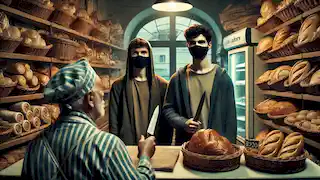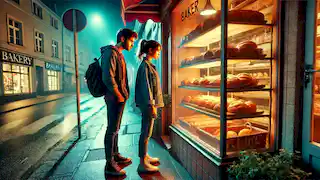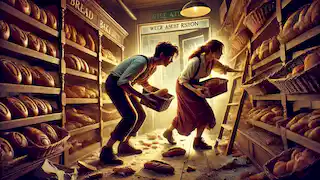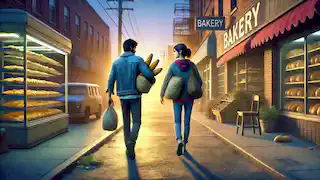It was around 2:30 in the morning when my wife suddenly shook me awake. I had been in a deep sleep, one of those sleep states where your mind feels submerged, detached from everything around you. I struggled to find my bearings, but it was clear that my wife wasn’t just casually waking me—there was urgency in her voice. Her breath was fast, and her hands felt cold against my skin as she whispered something in my ear.
"We need to eat something. Now," she said, as if it were a matter of life and death.
Still half-asleep, I propped myself up on one elbow, blinking against the darkness of our room. “What do you mean?” I asked, my voice groggy. “Can’t we just eat breakfast tomorrow?”
“No,” she replied sternly. “Not breakfast. We need something more... substantial. A meal. Something with bread.”
I stared at her, confused. In the three months we had been married, my wife had never displayed such a sense of urgency about food, especially at this hour. And what was with the sudden obsession with bread?
"You don’t understand," she insisted, her voice sharp. "It's a hunger that goes deeper than anything I’ve felt before."
For a moment, I was at a loss. Her face was taut with determination, and her hands clenched into fists as if she were grappling with some invisible force. And in that instant, a memory from my past suddenly flickered in my mind—a bakery. The attack. The strange hunger that had consumed me once before.
"Could it be...?" I murmured under my breath.
She nodded before I even finished my thought. "Yes," she said, her eyes wide. "This is the same thing. The same hunger you felt back then, isn’t it?"
And just like that, I knew what had to be done. Years ago, before I met my wife, I was involved in a crime—well, an almost-crime. I had just turned 18 and was in the throes of youthful rebellion. A friend and I had decided to rob a bakery. It wasn’t about the money; it was about the hunger. We wanted bread, and not just any bread—we wanted fresh, warm bread, straight from the oven. It was primal, instinctual, and neither of us could explain why it had become so important. But it was. The bakery was a small, unassuming place at the edge of town, run by an old man with a quiet, reserved demeanor. We entered with masks on our faces, brandishing kitchen knives—not the sharpest tools, but enough to look threatening. I remember the smell of flour and yeast in the air, the warmth of the ovens radiating from the back. “We want bread,” my friend had demanded. The baker didn’t flinch. He looked at us calmly, his eyes flicking from one of us to the other, as if he had expected this. Without a word, he nodded and handed over a couple of loaves. No resistance, no fear. Just bread. As we walked out, loaves in hand, there was no adrenaline rush, no sense of triumph. It felt empty, like we had accomplished nothing. We ate the bread in silence, our hunger slowly abating, but something about the experience lingered in the back of my mind like a distant echo. That feeling of hunger—it hadn’t truly been satisfied. It had just been momentarily quelled. Fast forward to the present, and I found myself sitting on the edge of the bed, staring at my wife as the same hunger from all those years ago resurfaced, creeping into my consciousness like a shadow. My wife sat next to me, her eyes full of the same primal need, as if we were both possessed by something beyond our control. "We need to eat bread," she said again, her voice barely above a whisper. "But it’s 2:30 in the morning," I protested, though I knew deep down that the time didn’t matter. This wasn’t a rational hunger—it was something else entirely. Something that defied explanation. "We have to do something about it," she insisted, her grip tightening around my arm. "We can’t just ignore it. You know what happens if we do." She was right. I knew all too well what could happen if we left this hunger unchecked. It would grow, festering in the back of our minds until it consumed us. And so, without further hesitation, we got dressed and left the apartment, heading out into the cold, quiet streets of Tokyo. The streets were deserted as we made our way through the city, the pale glow of streetlights casting long shadows on the pavement. Every bakery we passed was, of course, closed. I wasn’t even sure what we were looking for—maybe a 24-hour convenience store that sold bread? Or maybe something more primal, more elusive. "We can’t just buy bread from a store," my wife muttered, as if reading my thoughts. "It has to be fresh. It has to be from a bakery." "But all the bakeries are closed," I replied, frustration seeping into my voice. "What do you suggest we do? Break into one?" She didn’t answer, but the silence that followed was telling. The idea hung in the air between us, heavy and inevitable. We kept walking, the hunger gnawing at our insides like a beast that refused to be tamed. I could feel it rising, growing more insistent with each step, until finally, we came across a small, family-owned bakery tucked away in a narrow alley. The lights inside were off, and the place was clearly closed for the night. But there, in the window, was a display of freshly baked bread, still warm from the ovens. The sight of it made my stomach clench in anticipation. "We’re doing this," my wife said, her voice low and steady. I hesitated for a moment, but the hunger was too strong. It overpowered any sense of logic or reason. And so, just like I had done all those years ago, I found myself standing outside a bakery, contemplating a crime I didn’t fully understand. We broke into the bakery with relative ease. The back door was unlocked, and we slipped inside, the smell of freshly baked bread filling the air. It was intoxicating, and for a moment, I felt lightheaded. "Quick," my wife whispered, grabbing a loaf from one of the racks. "We need to eat." I followed her lead, taking a loaf of my own and tearing into it with an urgency I hadn’t felt since the first bakery attack. The bread was warm and soft, the crust perfectly crispy. It melted in my mouth, satisfying the hunger in a way that nothing else could. But even as we ate, I could feel that same sense of emptiness creeping in. Just like before, the hunger wasn’t truly being satisfied—it was just being momentarily silenced. "We need more," my wife said, her voice trembling slightly. "More?" I echoed, though I already knew the answer. She nodded, her eyes wide and desperate. "It’s not enough. We need to take it all." And so, we did. We filled our arms with loaves of bread, pastries, anything we could carry. We ate until we couldn’t eat anymore, but still, the hunger remained. It was insatiable, a bottomless pit that could never be filled. By the time we left the bakery, the sun was beginning to rise, casting a pale light over the city. We walked in silence, the weight of what we had done hanging heavy between us. But more than that, there was a deeper weight—the realization that this hunger would never go away. No matter how much bread we ate, no matter how many bakeries we attacked, it would always be there, lurking just beneath the surface. As we reached our apartment, I glanced at my wife. Her face was pale, her eyes hollow. She looked as exhausted as I felt, and yet, there was something in her expression that told me this wasn’t over. Not by a long shot. "We’ll have to do this again, won’t we?" she asked, her voice barely above a whisper. I didn’t answer. I didn’t need to. We both knew the truth. The hunger was never going to go away. It was a part of us now, a force that would drive us again and again until there was nothing left. And so, as we climbed into bed, the remnants of the bakery attack still clinging to our clothes, I closed my eyes and tried to push the thought from my mind. But even as sleep began to overtake me, I could feel the hunger stirring once more, waiting for the next time it would rise and demand to be fed. The next morning, the world continued as if nothing had happened. We went about our daily routines—work, chores, mundane conversations—but there was a quiet understanding between us, an unspoken pact. We both knew that it was only a matter of time before the hunger would return. In the weeks that followed, we did our best to ignore it, to pretend that everything was normal. But the hunger never truly went away. It was always there, simmering just below the surface, waiting for the right moment to strike again. And when it did, we would be ready.Chapter One: The First Attack

Chapter Two: The Hunger Returns
Chapter Three: A Late-Night Quest

Chapter Four: The Attack
Chapter Five: The Aftermath

Chapter Six: A Quiet Morning




















